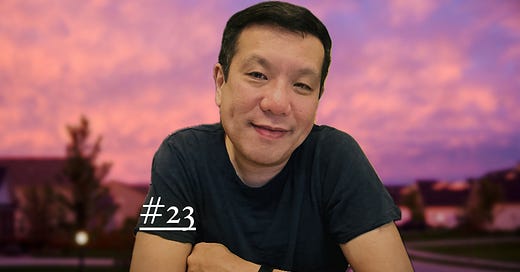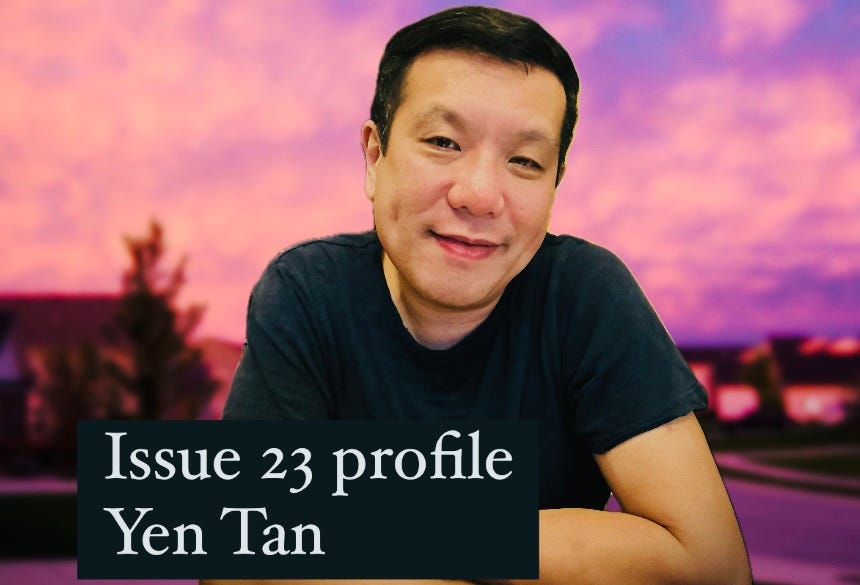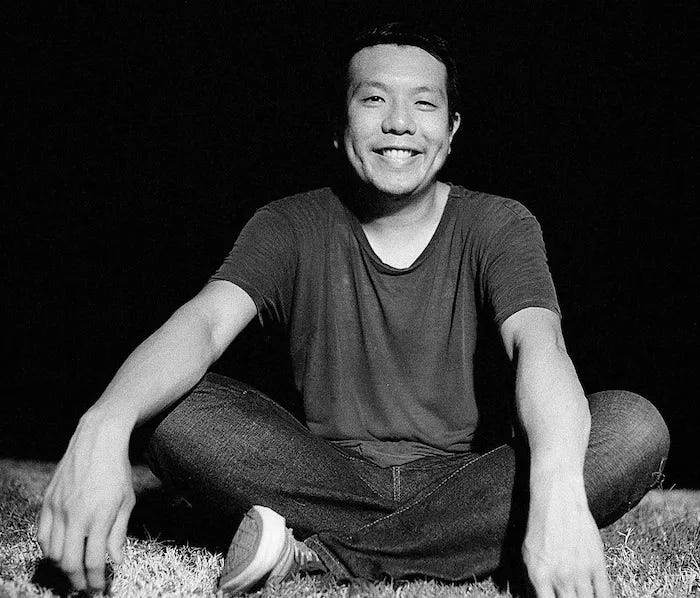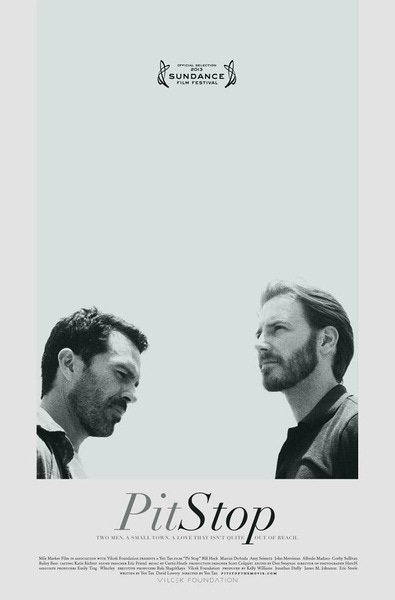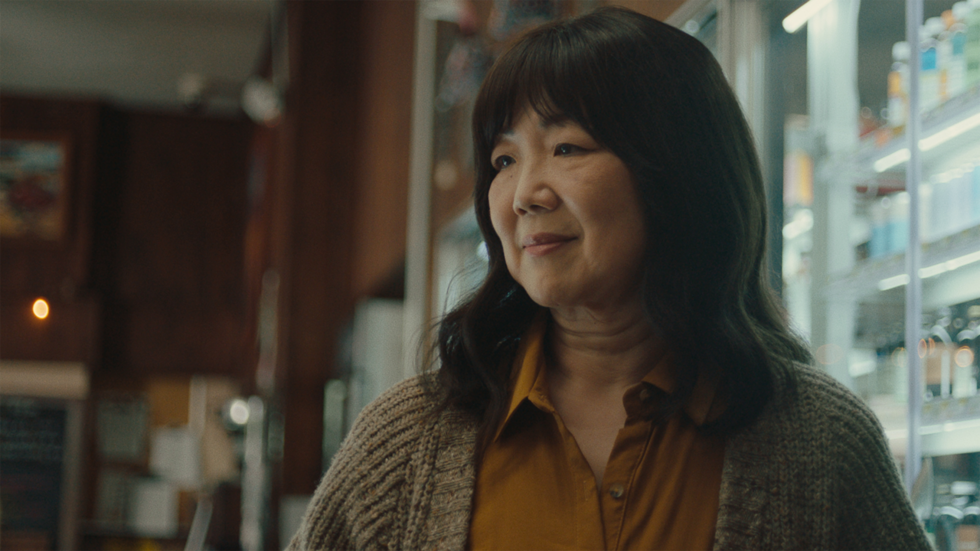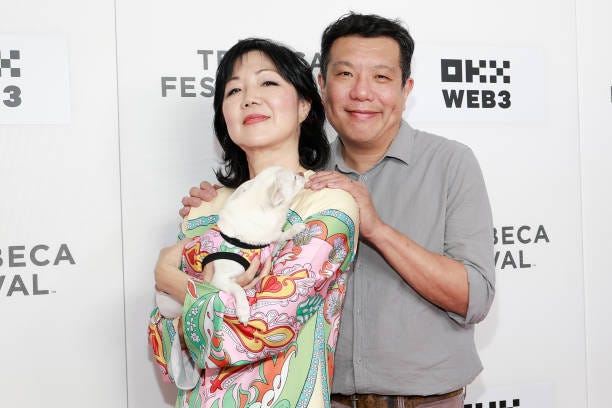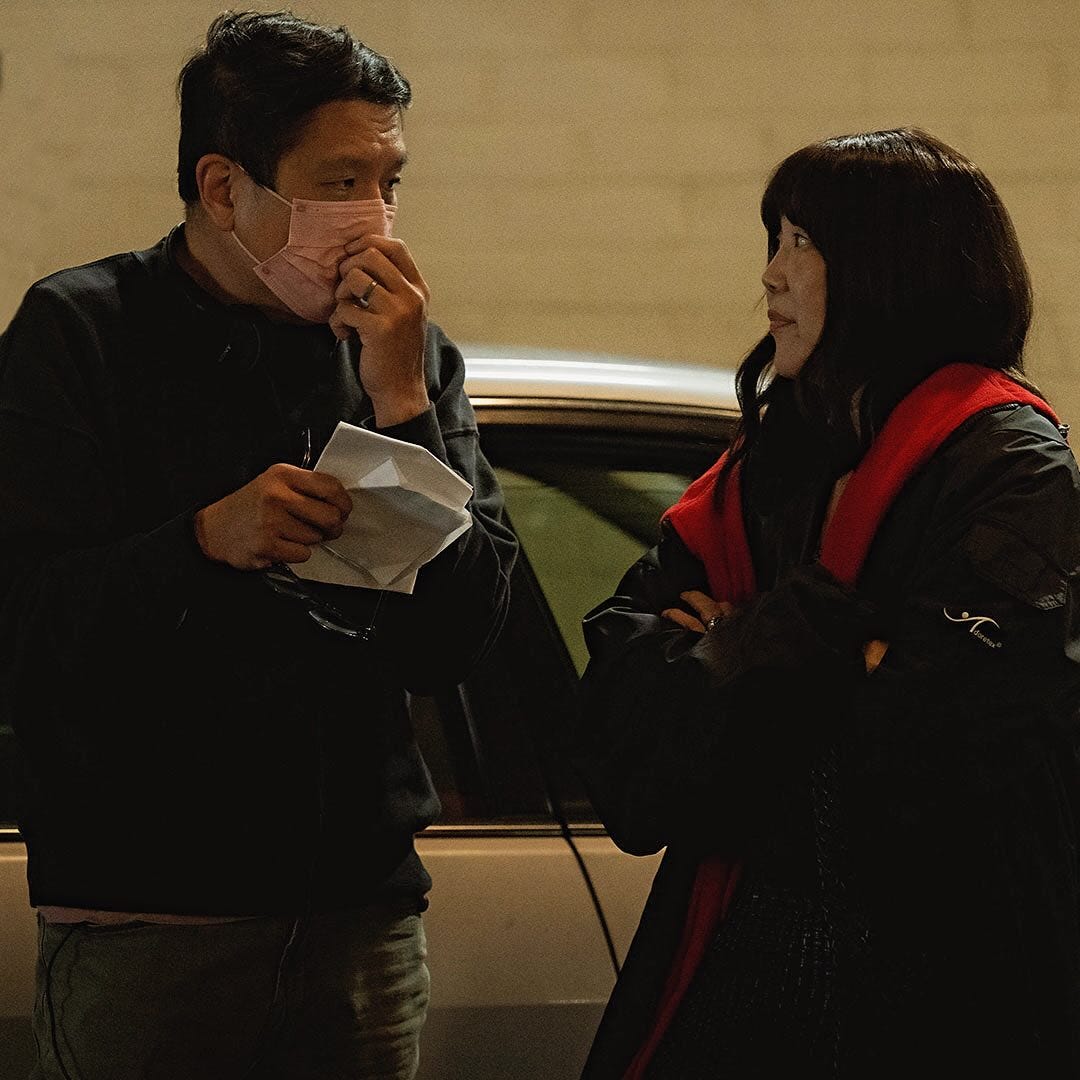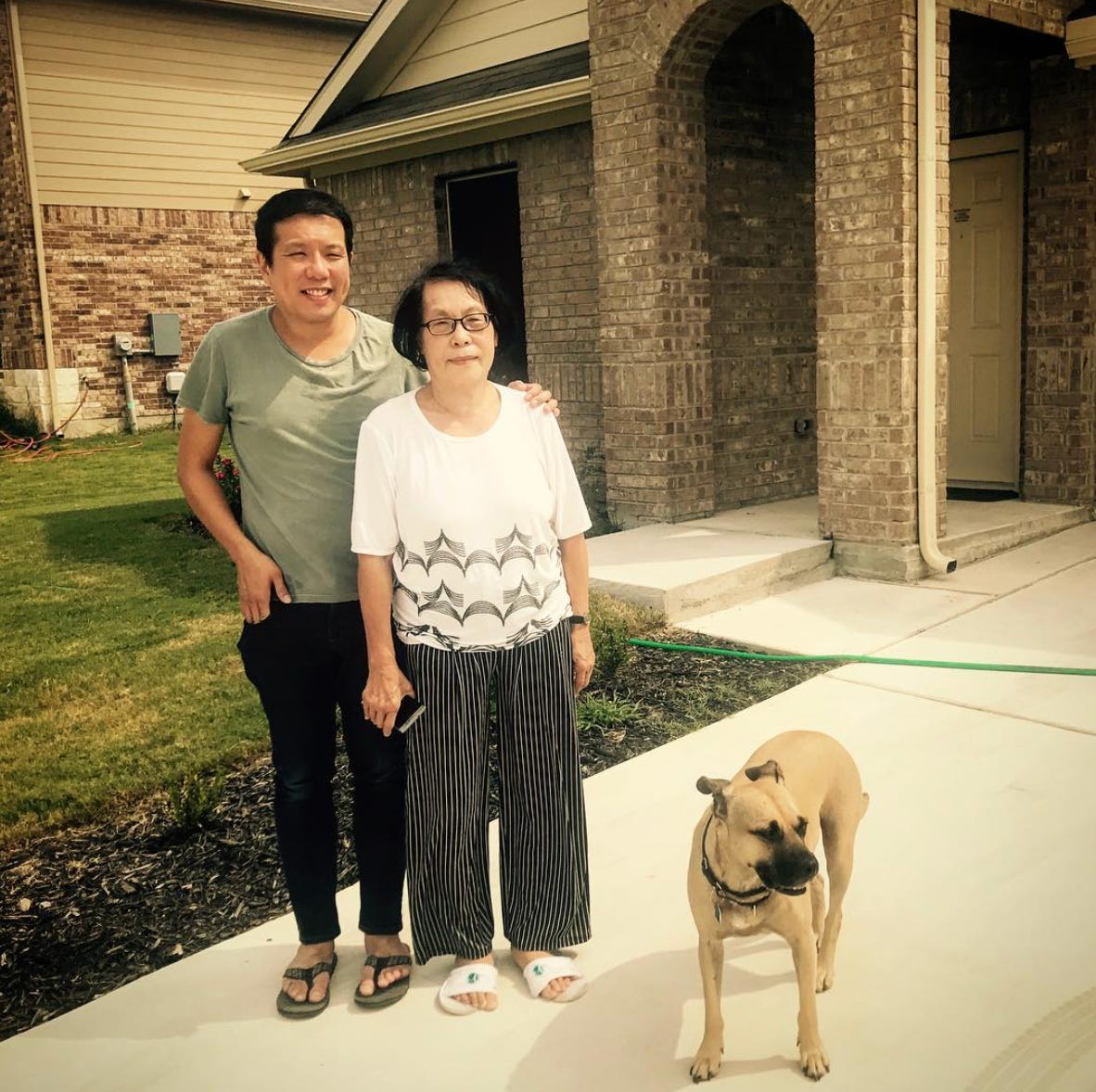Asian A.V. Club newsletter #23: Yen Tan
Director Yen Tan discusses his journey as a filmmaker from growing up in Malaysia to telling intimate stories, culminating in his most personal work yet, All That We Love.
Whether they knew it or not, the parents of director Yen Tan inadvertently gave him an education in cinema studies by taking him to the movies as an impressionable kid in Malaysia. It was on that screen that captured Tan’s imagination and inspired him to go to the United States to try to pursue a route to tell stories from his distinct perspective.
Through his work over the past two decades, Yen has found a gentle, commanding voice in stories about adult gay love (Pit Stop), a child returning home to tell his family he has HIV (1985) and now an Asian woman (Margaret Cho) trying to find her way in life after the death of her beloved dog (All That We Love). Inspired by the true story of the death of his beloved dog Tanner 10 years ago, Tan collaborated with writer Clay Liford to explore the different nuances of grief and the complex elements of hope in new beginnings. We caught up with director Tan and had an honest open chat that we’re still pretty chuffed about.
Asian A.V. Club: Every filmmaker I talk to has a great story about the movies that inspired them to pursue filmmaking. I know you grew up in Malaysia, so I was wondering what your cinema education looked like during those formative years.
Yen Tan: My exposure to cinema happened very early in my youth. My dad especially loved going to the movies, and he would bring me with him. So, I was going to the theaters as young as four or five years old, and one of the observations my parents made about me was that I was unusual as a child in that I was always captivated by the screen. Even though there's no way I could understand everything that was happening at that time, but I was drawn to it.
Every time they brought me to the theater, they would have no problems with me because I would sit through everything; I wouldn't cry and be bored. Maybe there was some sort of slight kinship to this idea of watching other lives on screen.
And my diet of cinema at that point was mostly American cinema and also Hong Kong films. Malaysia is a cultural melting pot of the Malays, the Muslims, South Asians, and the Chinese, so I was kind of into everyone's stories, and it was kind of democratic where everything was viewed in my eyes, in the same way. I was definitely drawn to more Hollywood stuff because there's a slickness and polish to the production quality, that was more appealing on a superficial level.
Asian A.V. Club: Was there a moment during those years where you thought you wanted to make movies yourself?
Yen Tan: Watching Hollywood films, I never thought that I could make them because they seemed so big and out of reach. It wasn’t until I discovered Wong Kar Wai’s Chungking Express that I saw something that was homegrown, in a grungy sort of way, that made me think we could all just grab a camera and shoot something that seems very mundane but ends up being very poetic and profound. It was life changing to see that people could make those kinds of movies.
Asian A.V. Club: So, when you went to university in the US, was the goal to learn how to make movies?
Yen Tan: There were negotiations with my parents because for them it was like, ‘what are you talking about, education in film school? That doesn't make any sense.’ For most Asian families, you send your child overseas and they come back to their country and get a good job. But I'm thankful that they were very understanding that I wanted to do something creative since I was just terrible at science and math. (laughs) They just suggested, ‘can you do something that's more like, Mass Communications/ Advertising’. And then that's what I ended up studying.
But always in the back of my head, I thought, you know, advertising is a gateway into commercials, which is production. So, I went to school for that.
Asian A.V. Club: Did advertising lead to filmmaking then?
Yen Tan: Not really. Filmmaking came in a more self-taught sort of way. I moved to Dallas, found the community of people, really started watching a lot of films, took classes at night and just sort of figuring out how to, you know, make stuff.
Asian A.V. Club: The films you made really came from a personal perspective. What was it that inspired you tell these honest stories?
Yen Tan: This idea of personal filmmaking, honestly, I don't even know how it came about. I just know that these are the kind of films that resonated with me when I watched them. And it could be any kind of movie, even a Hollywood one, where there would be certain scenes that I would be like, ‘Oh, that feels like it came from a very specific point of view.’ Because it just hits you deeper and felt very specific. I had these feelings way back even when I was watching John Hughes films, where I was like, ‘this guy really knows what it's like to be a teenager’.
Ultimately in the back of my mind, I always knew I wanted to tell stories like this. But it was very gradual. I’ve always admired my peers, especially my white American filmmaker friends, where they could come out of the bat and just say, ‘I’m a guy, I'm writing about a guy like me, and this is a story’. For me, I always had to filter my personal voice through white characters because that was the only way to get anything financed. And that was the reality more than a decade ago.
Asian A.V. Club: Now that you mention it, your earlier films have mainly white protagonists.
Yen Tan: Like I said, it’s been gradual. I wrote about white characters (Pit Stop), then it was ‘sort of’ non-white characters (1985), and then to now we have arrived to Asian, but even now it’s a story about a woman, who is actually heterosexual. Still through a filter of sorts, but I’m getting closer. Maybe the next one I’m going to be writing about someone just like myself.
Asian A.V. Club: What did it feel like for you to write All That We Love for a predominantly Asian cast? Did it allow for you to cut out a lot of exposition because you were working with people that just got the cultural nuances of what you’re writing about.
Yen Tan: It was definitely liberating in a sense because it made the writing easier just because there's no burden to set things up or explain it. I think I was also very intentional about what I was trying to do. It's something I conveyed to the cast and also through the creative crew. I made a very deliberate choice to work with Asian American department heads for this movie. From the production designer, director of photography, costume designer, and even our editor, there was a part of me that was very curious about whether it would be a hidden benefit to the story itself. I think everyone appreciated that.
Asian A.V. Club: In this film, your lead character Emma ‘s (Margaret Cho) beloved dog dies, and she goes on a personal journey to find her place in life. Though it’s a movie that's centered around grief and loss, it's not a downer movie, and in fact is quite uplifting. How did you find that fine line?
Yen Tan: I think that is how I grieve, honestly. I feel like there was so many moments of laughter for me, and obviously I cried a lot, but I think laughing was a way to give myself a break and to sort of appreciate this idea of how to live. Being alive, as an experience, is almost a privilege in a way, especially around people and having a deeper understanding of what it means to be in a community, to have friends or family and to have love, and all that stuff.
A lot of is very joyful, honestly, to be able to arrive at a point to have a more meaningful reflection of these things that we often take for granted on an everyday basis. And so that back and forth, is what real life is and what I would think is how a lot of people grieve. That sort of yin and yang of it is very true and genuine.
Asian A.V. Club: What was it like to have Margaret be that person to represent that experience? It must have been interesting to observe her walk through this space especially since it’s a story that’s been in your head for over a decade.
Yen Tan: I think I was always intrigued by this idea of not just putting Margaret in a movie like this or playing a part with a lot of thematic things that she personally connected with. But also this idea of putting Margaret in situations that felt a little bit more like arthouse cinema, where the scenes of are being in a space alone with no words. She’s just reflecting on what's going on.
Whether it’s when she comes home drunk from karaoke birthday party, and then she's hanging on to her dog's collar and rattles it in the dark, or she's distracted and makes dinner for herself, but then also fills up the dog's bowl, not thinking that they’re already gone. Those moments of silence and reflection is something I don't think anyone envisions Margaret doing. It was this personal curiosity to see what would happen if we presented Margaret in that light.
Asian A.V. Club: Did she bring anything that was not on the page?
Yen Tan: Totally. A lot of it, she never expressed it to me. She just gives you something in a scene itself that you discover in the footage afterwards. There was a kind of the magic to it, and I think comes from a very real place for her.
Asian A.V. Club: There's a lovely moment, towards the end of the film, where Emma is struggling to mend her broken family and she suggests that they not talk and just eat their meal. It’s the most Asian thing I've seen in a while, where somehow through the quiet act of a family meal, it might just fix itself. I’m curious, how did you get to that point to write that in that movie?
Yen Tan: I think to go back to what you were saying earlier, this idea of not making any overt Asian stuff, you know, addressing Asian-ness in this film, but that scene is an Asian moment, for sure. I think intentionally I put it in there where I was like, this makes a lot of sense for an Asian family to have a moment like this. I don't know if that scene works quite the same way for non-Asians, but I definitely thought let's do it for this scenario. I just had this feeling that it was going to come across cinematically and convey a lot more in the process.
Asian A.V. Club: All your previous films were shot in Texas, what was it like for you to shoot this film in LA?
Yen Tan: LA was a really wonderful experience. I think I was very lucky being able to rely on the expertise of everyone else around me, who knew LA a lot more than I did. And just this version of a tremendous relief of being surrounded by a lot of Asian people on set. It felt very much like coming home in some weird way. Working with people who look like me, and, and being able to have the shorthand and even being able to occasionally speak in Mandarin was kind of, very profound for me, to work in that kind of environment. And it just makes me feel like I want to continue working like this. There was this sense of being surrounded by family in some interesting ways, even though I was just getting to know a lot of these people for the first time.
Asian A.V. Club: Does Emma’s characteristics reflect any part of your mom that you secretly wrote into the script?
Yen Tan: For sure. I mean, my mom or even my sister or my aunts. I think there's different aspects of them in this character. I've always been very close to my mom, and I think a lot of it is because I'm queer. Even though she struggled with it when I came out, I think within her, she kind of understood that she was close to me because of that. Even though she did not acknowledge it, she sensed it from me from a young age. But then once everything clicked into place, I think she understood why she was closest to me on an emotional level.
I really attribute a lot of my sensitivity to human observations to her because she and I talked a lot about human psychology and human behavior and why people do the things that they do. I think all these things are things that I picked up from her.
Asian A.V. Club: Did growing up queer in Asia and feeling like a bit of an outsider also help contribute to the way you observe life and advise your creativity?
Yen Tan: I think it just happens in ways that I don't intentionally engage because I feel like, this is just my natural way of seeing things. I don't know any other way of seeing or experiencing things. I think it's already wired in me to just always look at things from the outside, and also being able to consider everyone in this particular situation and where each person is coming from. I also believe in this idea that nobody is really who they are, and that we all have dimensions to ourselves that can be engaged and revealed when the time comes.
Asian A.V. Club: I love the fact that you have this very successful career with your graphic design company Otto is the One. Some of the key art you’ve worked on finds the essence of the movie through just one image. Does that ability to pair-down things extend to the shots we see in your films?
Yen Tan: I don't necessarily have the privilege to be super meticulous about everything because I think I'll just end up driving everyone crazy including myself. (laughs) I'm not that type of filmmaker. I'm very much the type who actually runs things on schedule, I don't go over, and I make decisions really quickly and I stick with them. I think this the Asia-ness in me because I try to make life easy for me and also other people. Honestly, I feel really bad when I make life tough for other people.
Asian A.V. Club: You mentioned that you’re moving towards perhaps writing about someone that is even closer in character to you, have you thought about bringing that story back to Asia where it all began?
Yen Tan: I would totally love to; I think that will be a marvelous experience to just be able to make an Asian film and also work with an all-Asian cast and crew. That'll be marvelous.
Asian A.V. Club: I think it'll happen. I have a feeling! Thank you again, it was truly lovely chatting with you!
Yen Tan: Thank you!


